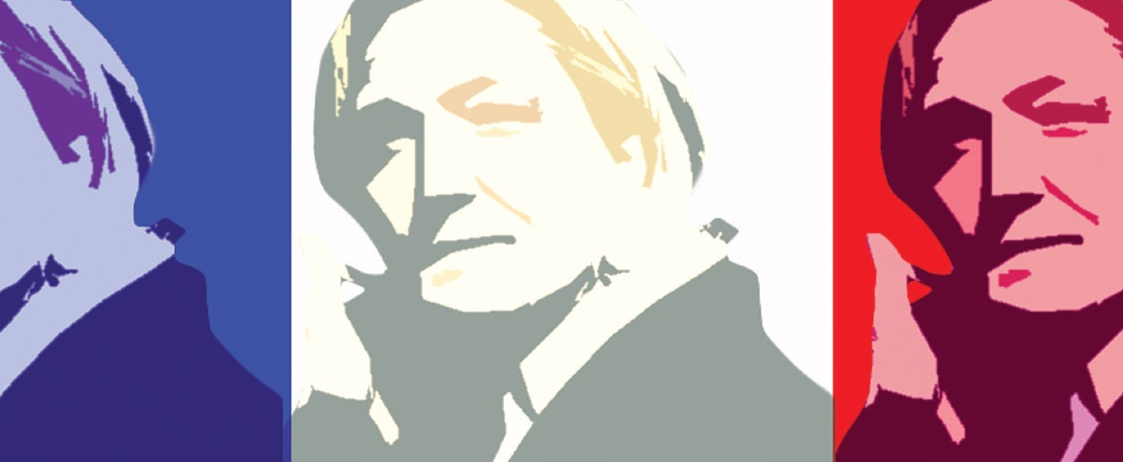
Les Français D’Abord
Marine Le Pen has a boxer’s shoulders, a wet handshake and a raspy smoker’s voice. She is the leader of the National Front in France, from a dynasty of Frontists. Her father Jean-Marie Le Pen was leader until early this year, her ex-husbands are both party functionaries, and her sisters are equally immersed in party life. The party’s emblem is Joan of Arc, who saved France from the foreigners; she acts as her rather less glamorous stand-in. Known to the French simply as Marine, she wants to take the party into the mainstream, and – crucially – make it electable.
I called a relative of mine who lives in a forgotten part of France that is famous for cow breeding, and who has recently retired after running a dog kennel. “I didn’t like Jean-Marie,” she said. “But you have to understand how different Marine is. When she speaks, people listen. And you can’t say that in relation to other politicians in France. They seem only to be talking to each other.”
The National Front was created in 1972 to satisfy the dreams of its wayward buffoonish supporters. Its origins are tangled up with the shame of the Nazi occupation and the horrors of the Algerian war. Frontists shared a view that their country had been stolen from them by the French elite, whom they hated almost as much as the waves of immigrants, who had in their view diluted Frenchness.
She is explicity not a Holocaust denier. But this apparent softening of the Frontist ideas is delusory.
The eccentricity of the French election system has been designed to keep out parties from the extreme Left and Right. In his long reign, however, Le Pen père was surprisingly successful. He became adept at flirting with France’s laws that prohibit holocaust denial and forbid racial abuse. In 2002 he surprised bourgeois France by knocking the feeble socialist presidential candidate out in the first round. In the second round Le Pen was roundly defeated by a margin of 82/18 by Jacques Chirac, but he had made his point. It was not just a minority of French people but a growing number who detested everything that they associated with mainstream politics.
Marine worked as warm-up act on her father’s behalf for many years. She was brought on to soften the image of the Front, and her commitment to family values was brought to the fore, despite the fact that she was a divorcée. But she had to wait for many years to assume her father’s mantle.
Cleverly she started by disassociating herself from the more extreme elements of the Frontists. She is explicitly not a holocaust denier. And she has also repeatedly told audiences that she is not opposed to Islam. But this apparent softening of the Frontist ideology should be view with suspicion. Marine believes that France should leave the euro and the European Union. The Front is still committed to sending immigrants home, with the vague qualification that this will only be done if they really want to go.
Not only does she look like someone whom you might see working in the local supermarket, she shares the views of ordinary, neglected French people.
You could say that she echoes Richard Nixon’s appeals to the ‘silent majority’ in 60s America. A lot of French people, my relative included, are xenophobic; and it begs the question – just how racist are the French? Marine could never win the presidential election, but she could come close. Polls suggest that she could beat Sarkozy in the first round, leaving a run-off vote against a feeble Socialist candidate. And it’s this politically astute, Nixon-esque cloaking of French racism in the red, white and blue that has made her and her extreme politics so palatable.
Marine’s apparent softness is in line with the position taken by far-right parties throughout Europe. Europeans will only vote for people whom they do no find frightening. So Marine, along with the True Finn party in Finland, the People’s Party in Denmark and the Sweden Democrats, have all set their minds on rendering themselves less unlovely. But they will be around for a long time. They poison the rest of politics by forcing cowardly politicians from the centre to accommodate their prejudices as a form of appeasement.
Marine will probably do better than the rest of these groups because she embodies a deeply normal anti-establishment chic in France. If you live in a rubbish part of France, don’t get invited to the sort of parties frequented by the Strauss-Kahns, and are unnerved by the ethnic minority-filled cités clustered around the town in which you live, Marine is the woman for you. Not only does she look like someone you might see working in the local supermarket, she shares the views of ordinary, neglected French people. And that’s why she will be so much more successful than her father.







